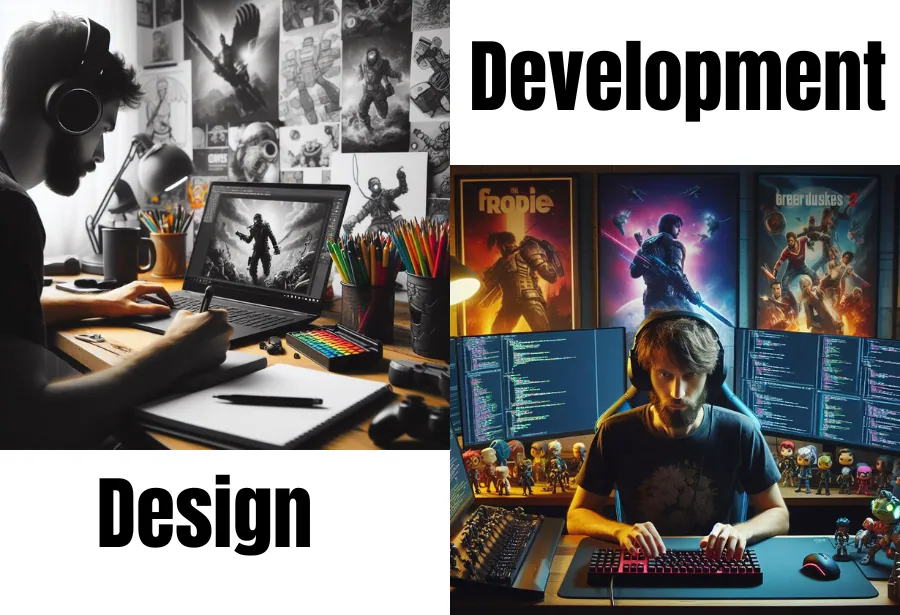“While game development entails coding and bringing those concepts to life, game design focuses on producing captivating player experiences.”
Game Designer and Developer When considering the differences between being a game designer or developer, many responsibilities should be kept in mind when exploring these roles within the video gaming industry. Both job titles often crop up together; although similar, each job entails unique responsibilities tailored specifically towards different skill sets and interests – this means one can suit you better than the other depending on which you prefer! Here is an outline of each position’s responsibilities as follows.
What is a Game Designer?
Game designers create plans with details about new projects by drawing up plans with all the pertinent details that outline them. Discussion of project topics such as target audiences, plots, genres, levels maps characters user interfaces as well as target audiences will allow further work on games after selecting concepts to ensure its overall vision is kept consistent with initial concepts and its development follows through accordingly.
Game designers work collaboratively in teams, each being responsible for an aspect of a particular game aspect. One group can focus on designing levels and placing items for players’ use while another team develops character evolutions or skill improvements as players progress through a game. Game designers’ concepts provide the basis of future work done by other specialists base on them.
What is a Game Developer?
Game developers specialize in the technical side of video game creation. Utilizing designer concepts as inspiration to write code and develop programs; then apply sound effects, artistic elements and sound design, identify solutions to potential technical limitations that a designer identified; perform various tests if no quality assurance team existed within a company; fit game designer ideas into code layout; consider all factors contributing to playability such as movement nuances, object interactions results and game mechanics when developing games;
Game development can be complex, which is why developers can rely on game engines. A game engine is an underlying piece of software that developers can repurpose as the foundation for creating new games – this software also reduces development time since no new code needs to be written! Large game studios usually employ their own game engines while smaller organizations often depend on open-source solutions.
Key Differences Between Game Designers and Developers
Below are the major distinctions between a game designer and a game developer:
Game designers create rules players must abide by and strategize ways players can overcome game elements; designers also develop backstories and decide how players progress, earn abilities, and unlock levels in a game. Meanwhile, developers work on its coding and debugging processes: this includes finding errors within code that interrupt gameplay as well as troubleshooting hardware challenges with consoles or devices supporting it – managing all three processes to ensure teams complete their respective tasks on schedule.
Require Job Skills
Below is an outline of the skills of game designers and developers:
- Creativity: Game designers utilize an active imagination when conceptualizing characters, concepts and storylines of games; understanding player interactions between these aspects and building unique challenges for players to overcome; while game developers draw upon their understanding of user interface and user experience design to make technically sound games.
- Game designs can be complex, so game professionals are required to remain flexible when meeting and working with others while efficiently managing time. Game developers need excellent time management skills to complete projects on schedule and deliver functional products at their release dates.
- Programming: Game designers use programming skills to ensure their project includes realistic animations and graphics; developers utilize programming languages like Java, JavaScript, C++, C# or Perl that help develop complex aspects of their games. Learning new programming languages such as this can prove advantageous when taking on either role.
- Collaboration: Building a game requires collaboration among various teams and departments working collaboratively on its completion, so being aware of how different roles can impact others is beneficial in making sure the product will be ready for release.
- Passion for Gaming: Game design and development can be an intensely competitive industry; professionals in this sector should show employers that they understand how games work, what improvements should be implemented, and what players want from them. Successful designers and developers understand what improvements need to be implemented as well as player preferences when designing or developing games, impressing employers through knowledge.
Game Design Career Path
Below are a few roles available within game design:
- System Designer: Game system designers specialize in crafting engaging game mechanics, systems and content to intrigue players while working closely with engineers, artists, UX specialists, product managers and production teams for system implementation.
- Game animator: Game animators create images or frames that create the illusion of movement when sequentially sequenced together. They can specialize in 2D, 3D, stop frame animation or computer-aided modeling/model-making with hand-drawn models/pictures/puppets as part of their practice.
- Concept Artists: Concept artists create images of creatures, props, locations, and people within the deadline. They provide sketches depicting character appearance as well as environmental details for game production companies to use when developing video game art assets.
Game Development Career Path
There are various roles within game development which you could potentially pursue:
- Artificial Intelligence Programmer: These programmers utilise Artificial Intelligence (AI) to program computerize opponent and ally reactions base on player actions in games with different difficulty settings. Artificial intelligence provides realistic character interaction while remaining strategic at all times.
- Graphics Programmer: Graphics programmers collaborate with artists and game designers to determine how art can best integrate into games and applications. Utilizing math-driven algorithms, they produce 2D and 3D graphics in both 2D and 3D forms.
- Network Programmer: Network programmers create code to allow game players to connect worldwide online and develop security measures against cheaters while still enabling competition among various geographical regions.
Conclusion:
Choosing between game design and game development depends on individual preferences, skills, and interests. Game designers contribute to the conceptualization and creative vision of games, while game developers bring these visions to life through technical implementation. Both paths require collaboration, time management, and a passion for gaming. Individuals interested in these fields should carefully consider their strengths and interests before pursuing a career in either game design or game development.

